Month: September 2020
Horse owners often joke that they take better care of their horses than they do themselves. While there are maintenance treatments and products that could be considered a luxury, veterinary chiropractic adjustments do not fall into that category. Palm Beach Equine Clinic veterinarian Dr. Ryan Lukens is a certified Veterinary Medical Manipulation Practitioner from the Chi Institute in Ocala, FL, and recommends every horse reap the benefits of regular chiropractic adjustments.
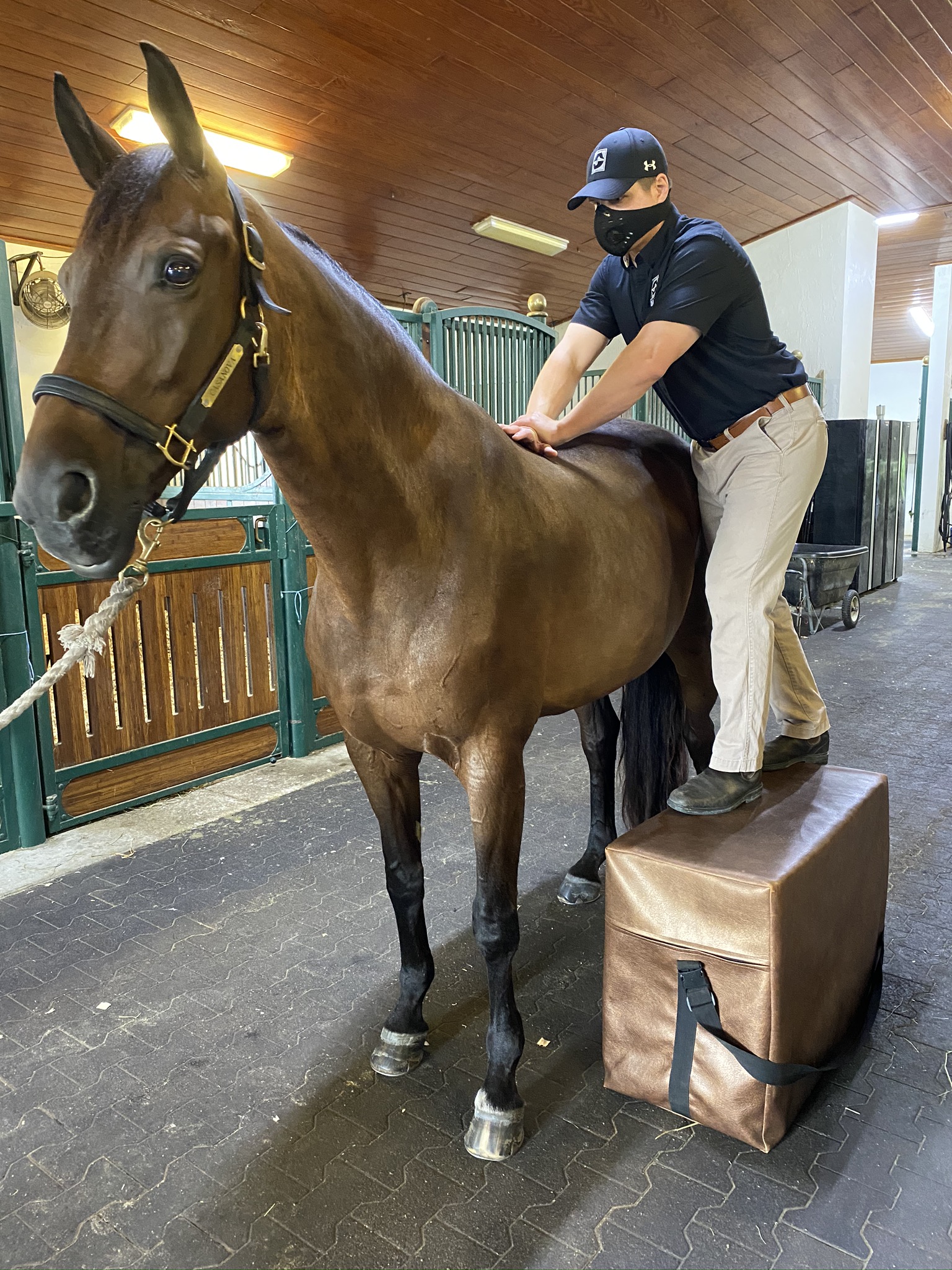 “One of the most beneficial outcomes of regular veterinary chiropractic adjustments is an increase in range of motion,” said Dr. Lukens. “Ensuring the horse has proper range of motion can greatly reduce the chances of them having to physically compensate for an area that may not be functioning up to par. By reducing the chances of compensation, we reduce the chances of many common sport hose injuries. Most athletic injuries occur when a horse is slightly off balance due to compensating. Regular chiropractic adjustments help horses to maintain their natural balance.”
“One of the most beneficial outcomes of regular veterinary chiropractic adjustments is an increase in range of motion,” said Dr. Lukens. “Ensuring the horse has proper range of motion can greatly reduce the chances of them having to physically compensate for an area that may not be functioning up to par. By reducing the chances of compensation, we reduce the chances of many common sport hose injuries. Most athletic injuries occur when a horse is slightly off balance due to compensating. Regular chiropractic adjustments help horses to maintain their natural balance.”
According to Dr. Lukens, further benefits of veterinary chiropractic adjustments include:
- Relief of pain and soreness
- Reversal of muscle atrophy by increasing the frequency of nerve activation
- Increasing the speed and accuracy of athletic movement
- Adjustments help calm the “fight or flight” response. This has a domino effect of improving various bodily functions, such as neutralizing stomach acids, improving hind gut digestion, lowering blood pressure, lowering cortisol levels, and strengthening the immune system.
Dr. Lukens outlines the “must know” details of an equine chiropractic adjustment for any sport horse owner. Here’s what he would like you to understand about your horse’s chiropractic adjustment:
1. The major adjustment points.
I take a full body approach to every session. There are 205 bones that comprise the skeleton of a horse, however, I am not just adjusting the skeleton––I work to improve motion at segmented levels that involve bones and the supporting soft tissue structures and nerves. I was taught to use “motion palpation” to test moving segments. If a segment is not moving freely in the appropriate directional planes, I can perform an adjustment to correct the restriction of this movement.
Major adjustment points include the:
- Mandible and tongue
- Temporomandibular joint (TMJ)
- Poll and cervical vertebrae
- Withers and sternum
- Front and hind limbs
- Thoracic and lumbar vertebrae
- Pelvis/sacrum
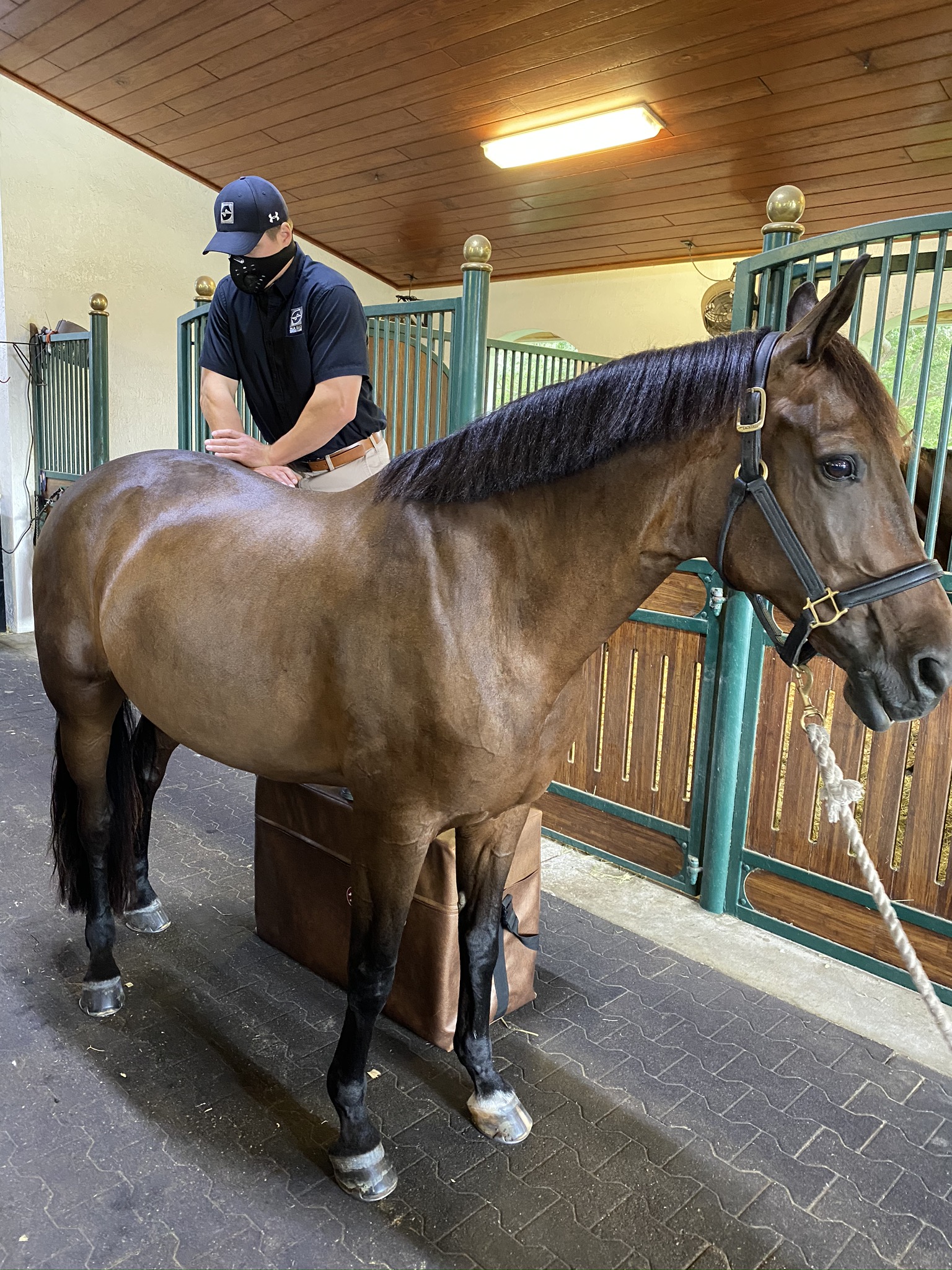
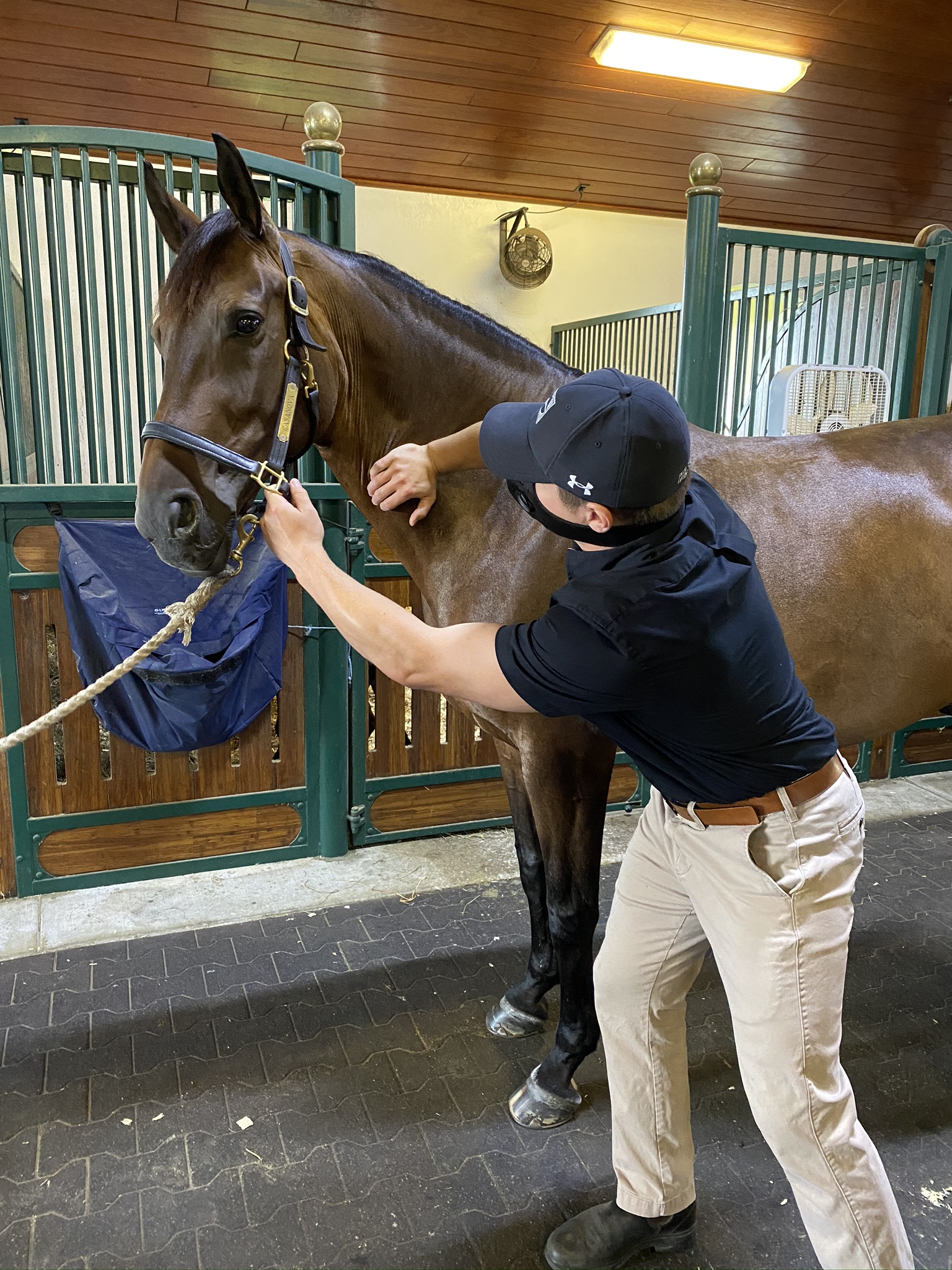
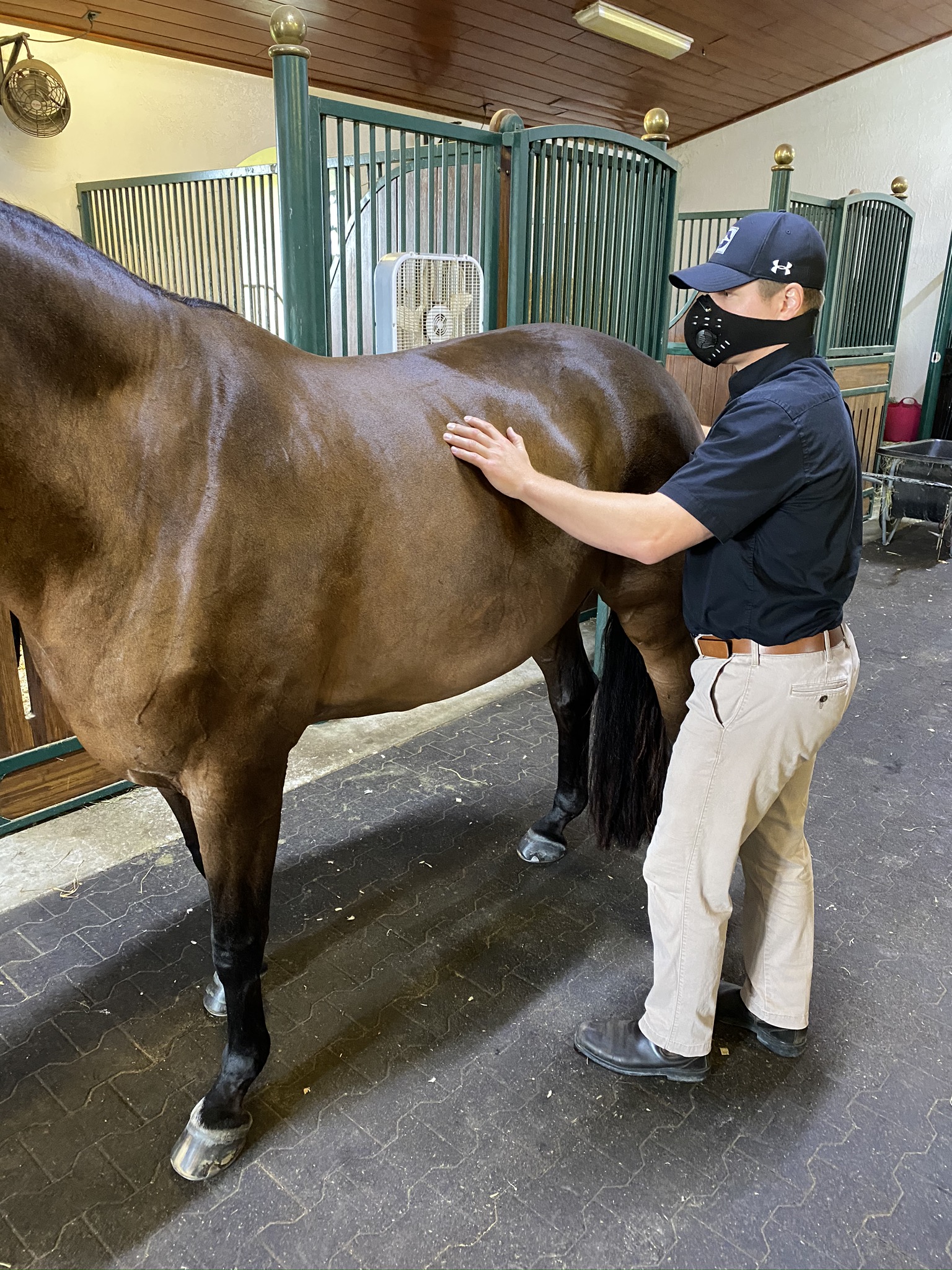
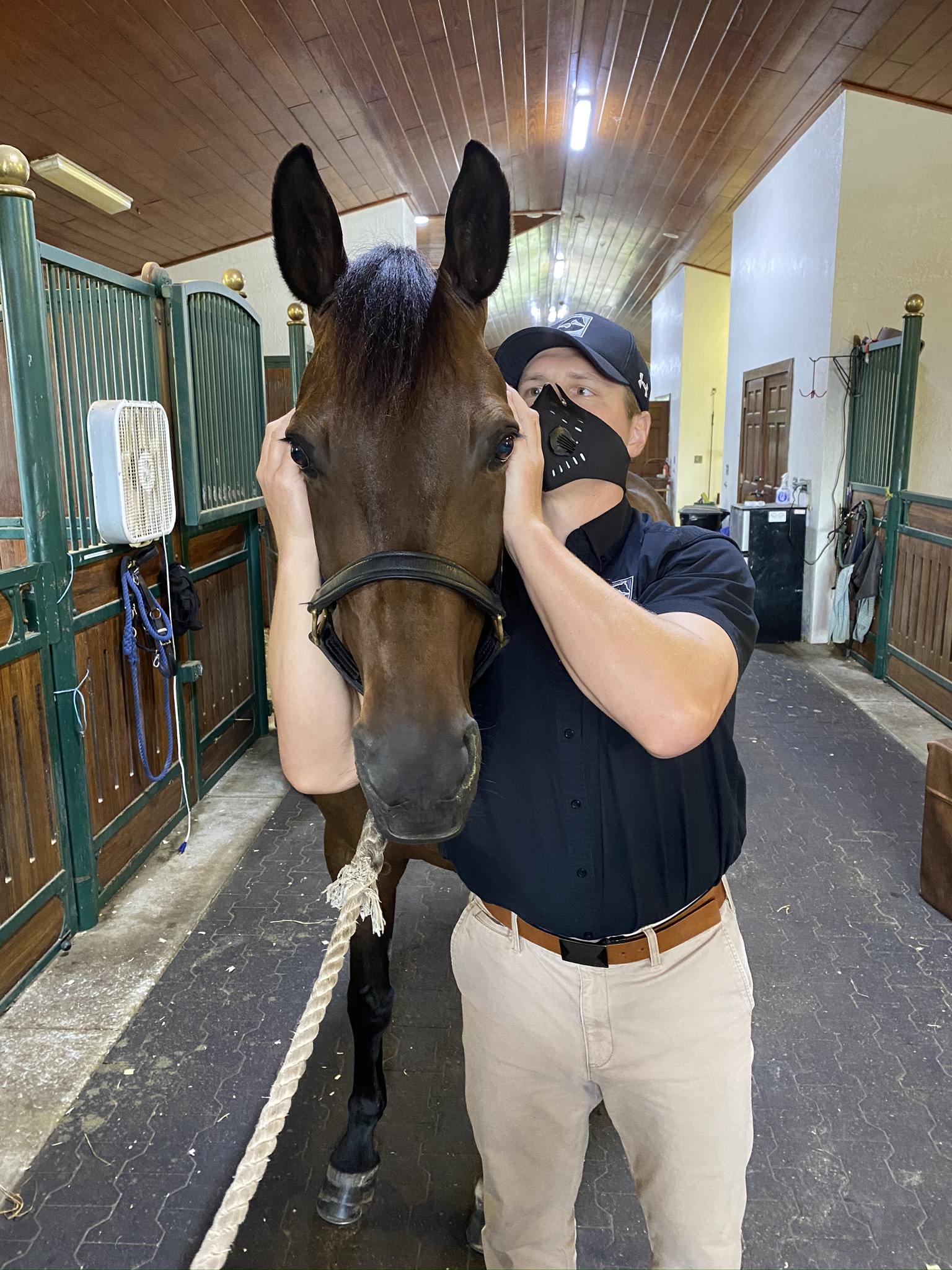
2. Every horse is different, and their discipline of riding places different demands on their bodies.
The most common adjustments for various performance horses include:
| Discipline | Common Adjustments |
|---|---|
| Dressage | Balance is essential for dressage. The major points of balance affected by veterinary chiropractic work are the TMJ, hyoid, sternum, and cervical facets. Other common adjustments affected by lateral work include the shoulders, elbows, and pelvis. |
| Hunter/Jumper | Hunters and jumpers typically benefit from vertebral adjustments of the lumbar and upper cervical regions, ribs, sternum, front distal limbs, and the shoulders. |
| Eventing | Most eventing horses benefit from adjustments to the pelvis, all cervical vertebrae, TMJ, ribs, and the shoulders. |
| Western Disciplines | Reiners benefit from adjustments to their right shoulder, lower cervical facets, withers and pelvis, and barrel racers benefit from shoulder, sacroiliac and hip joint adjustments. |
3. Things to keep in mind before and after an adjustment.
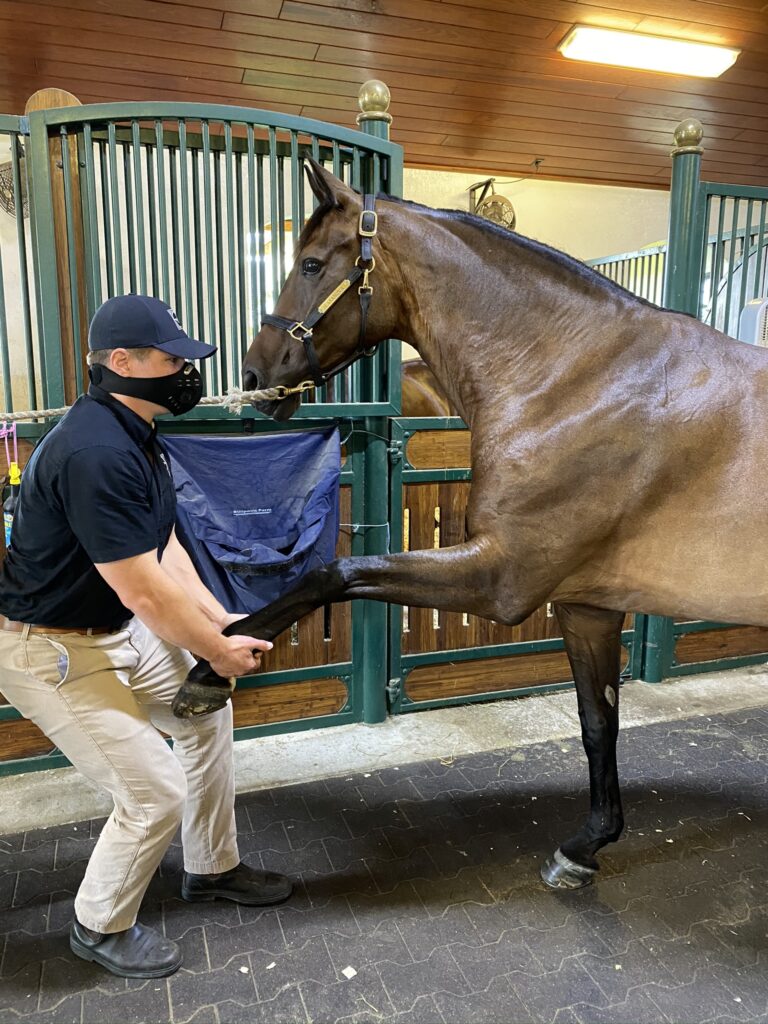
It is important that dental and farrier work is not overdue before veterinary chiropractic adjustments. Sharp dental points can cause adjustments to hold for shorter periods of time, especially in the poll, TMJ, and cervical vertebrae. In addition, if a horse is currently not shod well or has recently pulled a shoe, the adjustments of their limbs, back, pelvis and sacrum may not provide long lasting benefits.
Besides those prerequisites, a horse can be ridden before an appointment and have a normal day. The only restriction on riding is that they should not be ridden for the remainder of the day after the adjustment. However, they may be turned out to pasture after an adjustment. The following day, I encourage that the horse be ridden as normal and that the owner or rider follow up with me about how they felt.
I prefer to see new patients two weeks after their initial adjustment appointment. After the second appointment, I sit down with the rider to discuss and compare the chiropractic adjustments performed between the two sessions. If I made multiple of the same adjustments, their appointment intervals will stay at every two weeks. Once there is a decrease in similar adjustments, I can increase the time interval between sessions to three weeks. Some horses can maintain the adjustments for about four to six weeks when under lighter work. The rider can usually feel when a horse is due for another adjustment. As a rule, high-level performance horse can benefit from chiropractic adjustments as often as every week, but the most common interval for my clients at that level is every other week.
4. Chiro to the rescue! Common issues:
I often see some common issues solved by a veterinary chiropractic adjustment. For jumpers, changes in jumping style (i.e. landing away from a front limb, only jumping off of a certain lead) and performance (hitting more rails than normal) could indicate a lack of range of motion, which can be corrected through a proper adjustment or series of adjustments.
For dressage horses, a change in their balance could result in head tilting, not working through their back, lifting the lower cervical curve, or their hind limbs not following the path of the front limbs, and commonly seen in a new inability to perform tempi changes. That balance can be reestablished with an adjustment.

For western horses, a decrease in acceleration and turning can be indicative of needing adjustments.
5. How to choose your equine chiropractor.
The Chi Institute in Ocala, FL, trains only licensed veterinarians in medical manipulations (chiropractic adjustments). I believe that a veterinarian trained in chiropractic adjustments is the safest choice for the horse. A veterinarian’s extensive knowledge of anatomy and understanding of when not to adjust a horse is an important part of ensuring the horse’s safety and well-being. If done improperly, adjustments can have adverse effects. I received my certification (CVMMP, or Certified Veterinary Medical Manipulation Practitioner) in 2017 and have had great success in implementing chiropractic adjustments into my patients’ athletic successes.
To learn more about veterinary chiropractic adjustments or to schedule an evaluation for your horse, contact Dr. Lukens at Palm Beach Equine Clinic by calling 561-793-1599.

To properly operate an equine hospital, each member of the team must have the same goal in mind: high quality health care. Strong teamwork and leadership are essential, and Palm Beach Equine Clinic is fortunate to have our Equine Hospital led by Holly Hall. Born and raised in West Palm Beach, Florida, Holly has been an indispensable member of Palm Beach Equine Clinic family for over five years.
Get to know PBEC Hospital Manager Holly Hall
What is your background with horses?
My parents introduced me to horseback riding lessons when I was young. I originally rode English for a few years before finding that I had more of a desire for speed. I started barrel racing when I was eight years old and haven’t stopped since. My parents bought me my first horse when I was about nine years old, and soon that one horse turned into multiple horses. Throughout my high school years, I went to school in the mornings, worked at the barn in the evenings, and barrel raced on the weekends.
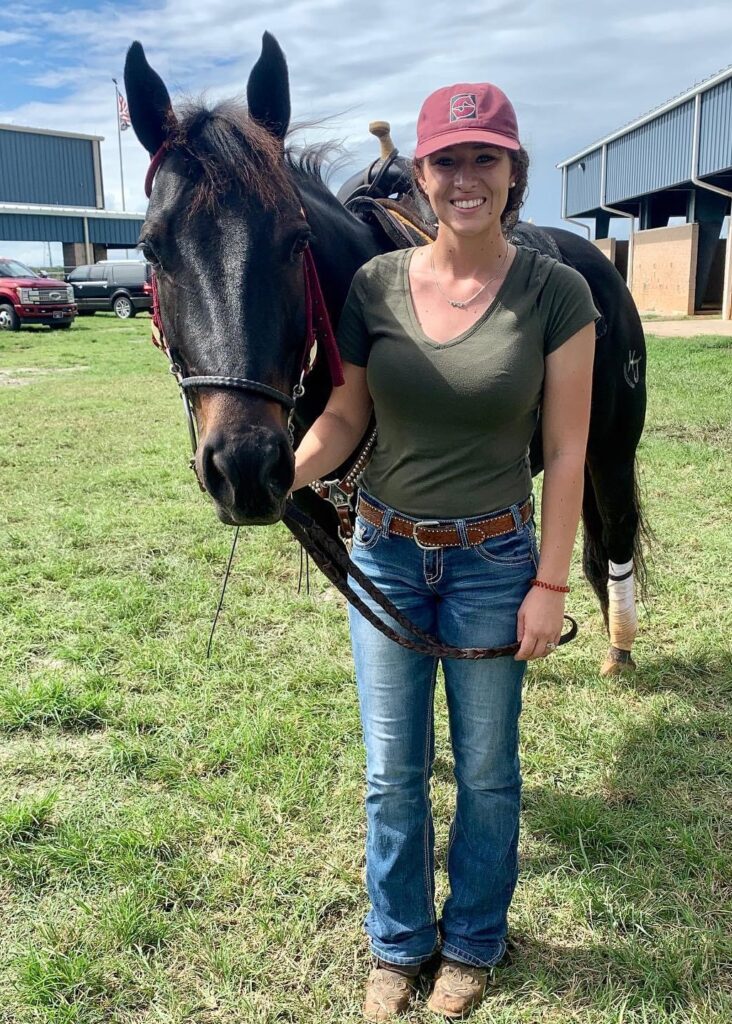
What was your original role at Palm Beach Equine Clinic?
Originally, I joined PBEC as a part time night technician and have since worked my way up to Hospital Management. Since my first days at PBEC, I have always loved the endless knowledge and experiences that I encounter and grow from every day. I immediately took an interest in emergency and surgical cases. I took every opportunity I could to experience and learn as many new things as possible about equine health.
Although my official position has always been with the hospital, I have gained experience in other aspects of the clinic throughout my time here. I am one of PBEC’s primary surgical technicians, have skills in preforming laboratory procedures, have worked with multiple doctor’s as their ambulatory technician, traveled to horse shows with our team, transported emergencies in our ambulance, and much more! I am always eager to lend a hand and take advantage of any opportunity to learn something new.
What are your daily responsibilities?
Throughout the day I manage patient care, hospital organization and our team of hospital technicians. I am responsible for updating patient’s Clinician Orders as per doctor’s orders and scheduling each patient’s treatment plan for the next 24 to 48 hours. The hospital technicians use these Clinician Orders to treat each patient and update medical records. Along with the technicians, I assist in completing treatments, procedures, surgeries, laboratory tasks, assist with admittance and prepare hospital patients for discharge. I also ensure that the hospital is well-stocked for any patient needs.
I am responsible for managing the technicians and their work schedules as we are an Emergency Hospital. The hospital is staffed with skilled technicians 24 hours a day, 7 days a week, 365 days a year. This includes all holidays and throughout storms. Our hospital team is responsible for the care of all PBEC patients, including the Intensive Care Unit (ICU)/surgery, Isolation (Quarantine), Annex (horse show) and Imaging stalls. Although our responsibilities seem endless, our hospital staff has a great system of communicating and we are dedicated to working hard for our patients and clients.
What aspects of Hospital Management do you most enjoy?
I really enjoy the intensity of helping with emergency cases and working in a surgical setting. Being a part of the initial work up, diagnostics, and watching our patients progress on their road to recovery is very satisfying. You never stop learning in medicine, and I appreciate the endless opportunities that I have to learn.

It is also interesting to be able to work with such a wide variety of horses. As technicians first and foremost, we must have the skills as horsemen to recognize the horse’s behaviors for personality traits versus potential changes to the state of their health. Carefully recognizing these symptoms and abnormal behaviors contributes to each patient’s treatment and enables us to make sure the horses are as comfortable and happy as possible.
Although our work is focused on the horses, we work with a large team of people to provide with best care possible. All our staff –veterinarians, technicians, interns, residents, specialists, surgeons, laboratory, pharmacy, imaging, and office administration –contribute to high quality patient care. I enjoy being a part of this team and watching all our efforts come together for our patients and client needs.
When not in the Equine Hospital, what do you enjoy doing or where can we find you?
My husband and I love being outdoors. We typically find ourselves out in the woods, on the water, or (of course) on the back of a fast horse! We mostly enjoy air boating and barrel races during our free time. Enjoying the company of our close family and friends, while doing what we love the most.
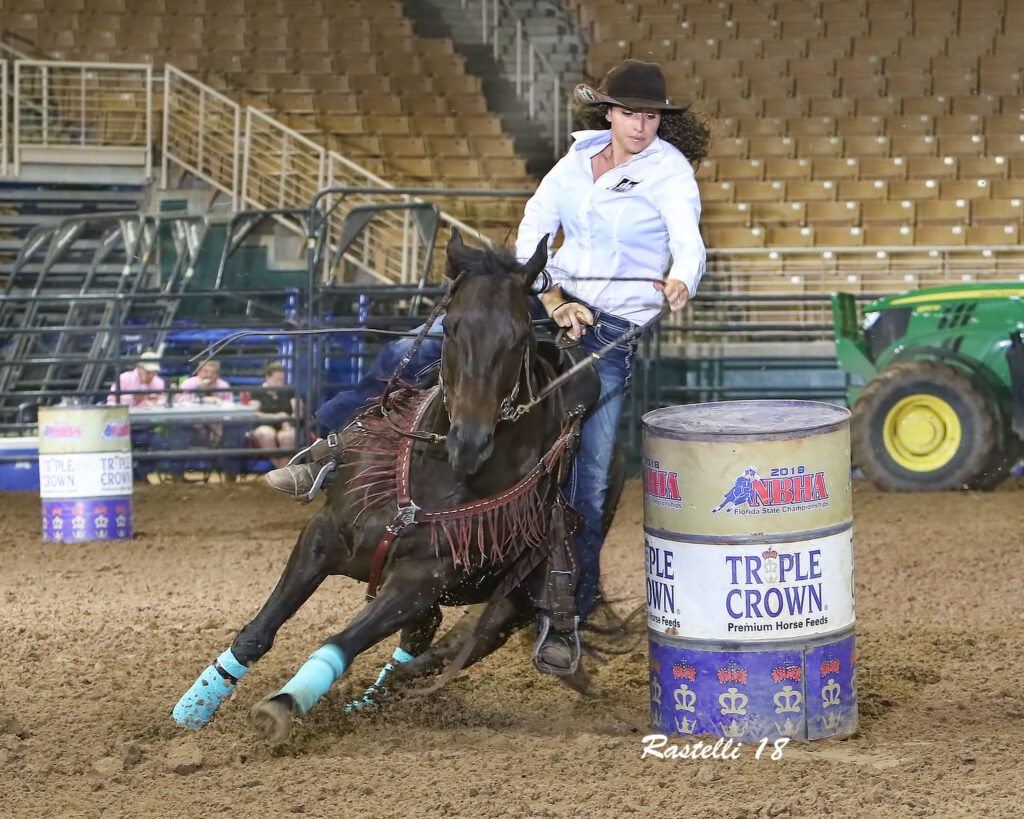


Palm Beach Equine Clinic veterinarian Dr. Marilyn Connor was recently featured in The Equestrian Podcast by My Equestrian Style where she explains her path to practicing equine medicine. Listen and learn about Dr. Connor by clicking on the recording below. For more on Dr. Connor, click here to read more about her and her interests in veterinary care.